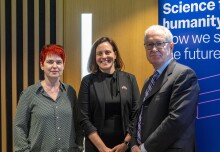

Dr Moncef Slaoui asks whether patients or shareholders should come first in a distinguished guest lecture
By Tanya Gubbay
Wednesday 25 January 2012
The Chairman of Research and Development at one of the world’s largest pharmaceutical companies last night shared his insights into the philosophy behind its work, in a distinguished guest lecture at Imperial College Business School.
Addressing the question 'Patients or shareholders first?', Dr Moncef Slaoui, from GlaxoSmithKline (GSK), said that there was a 'contract' between society and the pharmaceutical industry to deliver drugs and vaccines as effectively as possible, to as many people as possible and in areas where there is the greatest need. This, he said, gives the industry its fundamental reason for being. GSK’s focus is on delivering the best science to create the best possible value for patients and wider society.
See also:
Related news stories:
Dr Slaoui was brought up in Morocco and this, he said, instilled a determination to make public health more accessible and affordable for those who needed it. He first joined GSK in 1988 as part of the team developing new vaccines, including those to protect children against Rotavirus and pneumococcal infections and the vaccine to protect young women against cervical cancer.
Tanya Gubbay caught up with him after his talk:
What do you consider the main challenge for pharmaceuticals when looking to act in the best interests of patients and shareholders?
I would say ensuring delivery of new medicines and vaccines, so that they are approved by the reimbursement bodies, and made available to the people that need them. If we provide differentiated medicines and vaccines that are better than what is currently used, then the rewards for shareholders will follow. But it is not always that simple, especially in cases where there is great medical need but no expected commercial return on the investment. For example, a malaria vaccine for Africa, or a new class of antibiotic that would be kept in reserve for use when resistance develops to currently used antibiotics. In these cases we must draw on our expertise but also find sustainable solutions, often through the involvement of partners.
What is GSK’s approach to managing that?
In the past five years we have completely changed our approach to research and development (R&D). We have refocused our early discovery work on the best science and sought external collaborations to make sure we have access to all the best external innovation. We have created small, focused teams with clear accountability for progressing new medicines and have simplified our operations and processes. We have also brought much more patient and payer insight into our process, to make sure we are meeting their practical requirements as well as innovating in science.

As one of the inventors, Dr Slaoui is proud of his work on GSK’s experimental malaria vaccine
What are the most enjoyable elements of your job?
Spending time in the company of so many stimulating and interesting people. There is literally never a dull moment. I am constantly humbled by the talent of the people in our organisation, especially those straight out of education, who see things in a very different way to senior people. It is also very rewarding to see the power of team work and how much more can be achieved than by individual working. Finally, I relish the projects we work on and seeing the key data that is produced. Sometimes it is incredibly exciting, other times it can make for depressing reading!
What are the most challenging?
I would have to say the stimulating and interesting people I just said were the best part of the job! In R&D we have over 10,000 people, all of whom are highly intelligent, and we have just had to make a number of tough decisions, including the closing of facilities, withdrawing from some areas of research, and making some people redundant. It has been very challenging to engage with and listen to thousands of people most of who have never seen or spoken to me before. It took a lot of energy to communicate, engage, motivate and maybe sometimes inspire from a distance. In all honesty, we did not start off very well, but we changed and brought people with us. Now, we have doubled our productivity and morale is higher than it has been in years. It is too early to declare victory but we have come a long way.
What achievement are you most proud of?
I am one of the inventors of GSK’s experimental malaria vaccine. This is a project that GSK has been working on for about 30 years, against all the odds and with tenacity. If we are successful, we could save millions of lives. I am already very proud of what we have done so far, but the real achievement will be if we succeed and the ‘not for profit’ vaccine is delivered to communities in Africa. I am also proud of where GSK’s R&D is today, compared to six years ago.
What would your advice be for anyone keen to work at GSK?
It would be different depending on what you want to do and what experience you have, but my main piece of advice would be to contact us to see if there are any opportunities you are interested in. All of our roles are posted on our website. GSK has a very wide range of career opportunities within its R&D organisation, which include roles for both scientists and physicians. In 2011 we launched an innovative programme, Esprit R&D, which offers the chance to join a fast track development programme. Over three years, participants gain the breadth of knowledge needed to launch a successful career in the pharmaceutical industry.
What do the next twelve months hold for Research and Development at GSK?
We are at a critical juncture in our history, with a pipeline of 30 new medicines and vaccines entering the late stage of R&D. In the next 12 months, we will have a clearer indication of whether all the changes we have made have been successful and if our medicines will be approved by regulators, paid for by governments and payers and made available to the people that need them. There is a massive amount of work to be done and everyone is working incredibly hard, but we are extremely motivated. Indeed, with many exciting changes on the horizon, who wouldn’t be?
-ends-
Article text (excluding photos or graphics) available under an Attribution-NonCommercial-ShareAlike Creative Commons license.
Photos and graphics subject to third party copyright used with permission or © Imperial College London.





